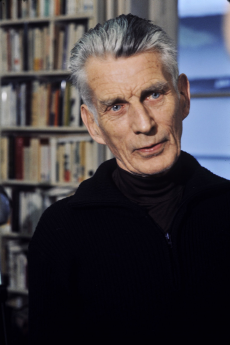
Samuel Beckett (1906-1989) was an Irish playwright, novelist, director and poet, commonly regarded as one of the most important literary writers of the twentieth century. He is considered to be a figure that bridged the gap between modernist and postmodernist literature, known for his use of black humour, irony and love of the absurd, often mixing tragedy and comedy in his work. His most famous play, Waiting for Godot, was no exception.
First performed in 1953, Waiting for Godot takes place on an unnamed “country road” in the evening, with the high-minded Vladimir and the dim-witted Estragon sitting doing various things whilst waiting for Godot to turn up. However, we are never told by the characters or anyone else who Godot is, why Vladimir and Estragon are waiting for him, or whether they’ve met him before. They don’t even seem to be aware how long they have been waiting for Godot, yet this is what they do for the entire play, in both of the two acts. For this reason one critic, Vivian Mercer, said that Beckett’s work "... has achieved a theoretical impossibility—a play in which nothing happens, that yet keeps audiences glued to their seats. What's more, since the second act is a subtly different reprise of the first, he has written a play in which nothing happens, twice."
Astonishingly, this is exactly what Beckett does. Even when reading the play by yourself you start to feel mesmerised by the conversation between Vladimir and Estragon and all their toing and froing, often navigating seamlessly from the tragic to the comic and back again.
And because the play has no real plot, with little to no sense of forward movement, we are simply there with the two main characters through every little moment, from Estragon trying to take his boot off at the play’s opening to Vladimir’s constant fiddling with his hat, with nothing to distract our attention away from them and this is part what makes Beckett a master playwright. He manages to craft the actions and dialogue of Vladimir and Estragon in such a way that the audience never feels any sense that there need be a plot to speak of. This is despite the fact that the two principle roles are essentially stock characters and we are only given glimpses of what their lives were like before the start of the play.
Beckett manages to maintain our interest in Vladimir and Estragon throughout in part due to their enigmatic philosophical wonderings and allusions, having us constantly contemplating what it is that he is trying to get at with these exchanges. That is, if he is trying to get at anything at all. Perhaps our inability to formulate a meaning out of this play is demonstrative of the very point about the human condition which he wishes to make; that much of our existence remains a mystery to us, our knowledge about the universe being infinitesimally small and that therefore our grasp of meaning and purpose is limited.
In this way then, Beckett never gives us easy answers, encouraging us to think about what happens in Waiting for Godot for ourselves. That is the true joy in going to see this classic play.
Sources: http://www.goodreads.com/author/show/82262.Vivian_Mercier
Image: Roger Pic [Public domain], via Wikimedia Commons

0 Comment:
Be the first one to comment on this article.